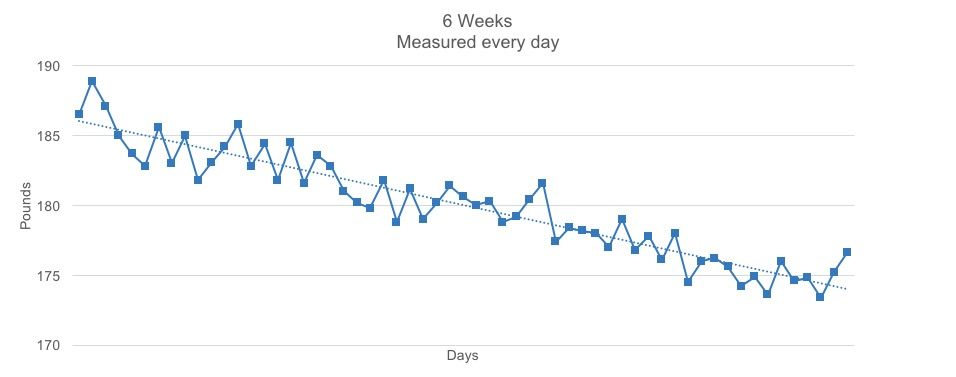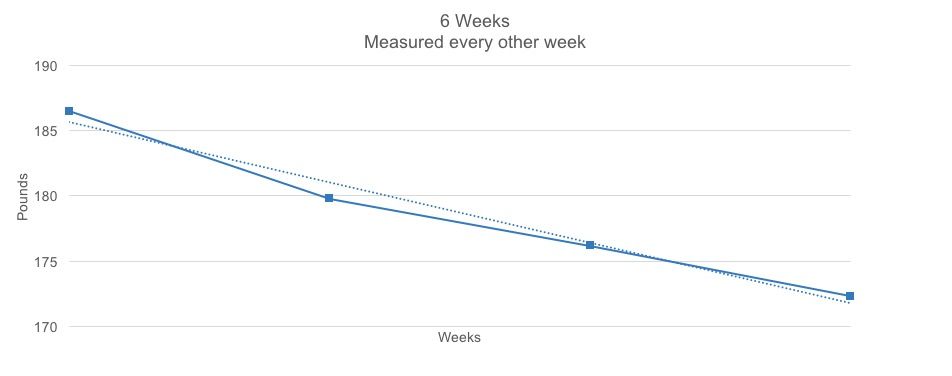looked down at the blue light shining through the glass of the scale. For the third time in a row, I had gained weight. I was struck by doubt: Was I doing something wrong? Do I need to change something?
I was halfway through a weight loss program that was supposed to help me… avoid purchasing a whole new wardrobe. In the first week, I lost a few pounds. Then, my progress seemed to have stopped. I was weighing myself twice a day and the last three weigh-ins reflected weight gain. Should I change something?
We all have moments where we wonder, “Is this really working?”
We’ve all set goals, made a change, and watched our results. But we get impatient, especially when the data doesn't look great. We start to wonder whether or not we should change our approach when, in reality, sometimes the best thing to do is sit tight and stick to your game plan. Why? Here’s the secret: stuff varies.
No matter who you are or what you’re doing, there are variables influencing the outcome of your efforts that you can’t control. This isn’t high school physics, where everything happens in a vacuum. This is real life.
What you can do is mentally prepare yourself to face variation. That way you can determine when to change your tactics and when to stay your course.
Let the solution work as designed for a period of time.
In our project work as Value Engineers, we face this challenge every time we set a goal for a project. We work with a team to clearly identify the problem, establish goals for improvement, and formulate a solution. In order to check our solution, we run a pilot. During that pilot, we don’t make changes unless it’s necessary. Usually it takes three to six months before we accumulate enough data to feel confident determining whether the solution is working or not.
My weight-loss data reflects the importance of not overreacting to data. I weighed myself twice a day for six weeks; I’m a data nerd and wanted to check for variability. Even though my numbers sometimes went up, that didn’t mean I wasn’t still progressing toward my goal. But I only realized that when I stuck to my plan and waited to see the results over time.
Daily measurement produces noisy data:

See the signal through the noise:

The wait-and-see approach avoids problems.
As you set SMART goals this New Year, track your progress—but make sure you don’t overreact to your progress until you’ve collected enough data to be certain. In other words, don’t break something that’s working.
This year, every time you’re caught off guard by new data reflecting a lack of progress toward a goal, take a deep breath, pull yourself together, and consider the big picture. Unless you’ve taken a significant step in the wrong direction, set the data aside and focus your efforts on staying the course with confidence that, weeks from now, this moment will likely register as a tiny blip on a more obvious trend toward success.
If you want to learn more about how to avoid overreacting to data, reach out to a Value Engineer, watch our videos, or sign up for one of our classes.
Noise and Signal explained:
Mitch Cannon
Balancing uncertainty, fear, and emotions isn’t easy — especially in health care. Family practice physician Kyle Bradford Jones looks outside of his practice to identify two common biases that affect how we behave in the face of perceived risk. His key insight? The risk that isn’t directly in front of us may be mistaken for no risk at all.
It’s part 2 of 4 in our series on process mapping. This post is about the reasons to build a process map. They’re inexpensive and so very often bear fruit for your effort.
It’s the third consecutive post in the Dojo’s summer of process mapping. Today I discuss 4 common facilitation issues LSS practitioners can avoid prior to, and during a mapping effort.
